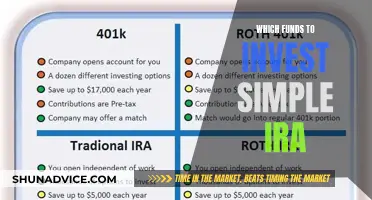
Investing in tax-exempt funds is a good strategy for those in a higher tax bracket. These funds can be a smart way to reduce your income taxes, but they're not for everyone. Tax-exempt funds are simply composed of investments that generate tax-free interest. They are offered by many prominent investment firms, and some even specialize in this type of vehicle. Mutual funds invested in government or municipal bonds are often referred to as tax-exempt funds because the interest generated by these bonds is not subject to income tax. However, before investing, it's important to ask yourself whether you are investing outside of an IRA or another retirement plan, and whether you are in one of the higher tax brackets.
| Characteristics | Values |
|---|---|
| Tax-exempt funds | Can be a smart way to reduce your income taxes |
| Who should invest? | Those investing outside of an IRA or another retirement plan and those in a higher tax bracket |
| Who shouldn't invest? | Those who are not in a higher tax bracket |
| Examples of tax-efficient investments | Municipal bonds, Treasury bonds, real estate, life insurance, annuities |
What You'll Learn

Weigh up the pros and cons of tax-efficient investing
Tax-efficient investing is a strategy that can help you keep more of your money by limiting the amount lost to taxes. It involves choosing the right investments and accounts to hold those investments. While taxes can be one of the biggest expenses on investments, there are ways to reduce your tax burden. Here are some pros and cons to consider when deciding whether to invest in tax-efficient funds:
Pros of tax-efficient investing:
- Tax savings: Tax-efficient investing can help you minimize your tax bill and keep more of your investment returns. This is especially beneficial for those in higher tax brackets.
- Flexibility: Tax-efficient investing offers flexibility in managing your taxes during retirement. By diversifying your investments across accounts with different tax treatments, you can have more control over your income and potentially reduce your overall tax burden.
- Tax-free income: Tax-efficient investing allows you to take advantage of tax-free income sources, such as municipal bond income, qualified dividends, and long-term capital gains from taxable accounts, and tax-free distributions from Roth accounts.
- Estate planning and charitable giving: Using different types of accounts strategically can help with estate planning and charitable giving goals. For example, donating appreciated securities from taxable accounts can provide a full fair market value deduction without capital gains tax.
Cons of tax-efficient investing:
- Lower yields: Tax-exempt funds typically produce lower yields, so if you are not in a higher tax bracket, you may not save enough in taxes to make up for the lower returns.
- Annual contribution limits: Tax-advantaged accounts like IRAs and 401(k)s have annual contribution limits, which may not be practical for all investors.
- Restrictions and penalties: Tax-exempt accounts like Roth IRAs and Roth 401(k)s have restrictions and penalties if you withdraw money before retirement age.
- Tax implications: While tax-efficient investing aims to minimize taxes, certain strategies may have unintended tax consequences. For example, rebalancing your portfolio by selling and buying assets may trigger taxable events in your taxable accounts.
In conclusion, tax-efficient investing can be a beneficial strategy for those looking to minimize their tax burden and maximize their investment returns. However, it is important to carefully consider the pros and cons and consult with a qualified financial or investment professional before making any investment decisions.
U.S.A.A. Mutual Funds: Where to Invest Wisely
You may want to see also

Understand the tax implications of each fund
Understanding the tax implications of different funds is crucial when considering tax-exempt funds. Here's a detailed guide:
Taxable vs. Tax-Advantaged Accounts:
There are two main types of investment accounts: taxable and tax-advantaged. Taxable accounts, such as brokerage accounts, offer flexibility but don't help minimise taxes. In contrast, tax-advantaged accounts like IRAs and 401(k)s provide tax benefits but have annual contribution limits and restrictions on withdrawals.
Tax-Deferred vs. Tax-Exempt:
Tax-deferred accounts, including traditional IRAs and 401(k)s, offer upfront tax breaks. You pay taxes when withdrawing funds in retirement. On the other hand, tax-exempt accounts like Roth IRAs and Roth 401(k)s are funded with after-tax dollars, but investments grow tax-free, and qualified withdrawals are tax-free.
Mutual Funds and Capital Gains:
Mutual funds can be actively or passively managed. Actively managed funds often trade frequently, generating taxable capital gains. In contrast, passively managed funds, like index funds, tend to be more tax-efficient due to lower turnover. Additionally, capital gains taxes depend on how long an investment is held. Short-term gains (less than a year) are taxed at ordinary income tax rates, while long-term gains are taxed at lower rates.
Municipal Bonds:
Municipal bonds ("munis") are generally exempt from federal taxes and can also provide state and local tax exemptions if issued by your state of residence. These bonds are considered safe investments backed by government entities. However, not all munis are tax-exempt, and investing in them may trigger the Alternative Minimum Tax (AMT).
Treasury Bonds:
Treasury bonds are exempt from state and local income taxes but are subject to federal income tax. The interest earned is taxed at income tax rates, not capital gains rates.
Other Tax-Efficient Investments:
Real estate investments offer tax deductions, favourable capital gains treatment, and potential incentives. Life insurance policies accumulate cash value with tax-deferral benefits, and proceeds are typically income-tax-free. Annuities also offer tax-deferred growth until distributions begin.
Tax-Efficient Strategies:
Consider placing active or less tax-efficient investments in retirement accounts to shelter them from capital gains taxes. Conversely, hold more tax-efficient investments in taxable brokerage accounts to minimise tax liability. Additionally, charitable donations of appreciated securities or real estate can provide tax deductions and help avoid capital gains taxes.
Savings Strategy: Mutual Funds Investment Allocation
You may want to see also

Know when tax-exempt funds are worth it
Tax-exempt funds are a smart way to reduce your income taxes, but they are not for everyone. Before investing, it is important to ask yourself a few questions. Firstly, are you investing outside of an IRA or another retirement plan? If so, you may benefit from a tax-exempt fund as you won't gain anything by including a tax-exempt fund in an already tax-advantaged account. Secondly, are you in one of the higher tax brackets? If not, tax-exempt funds are probably not the right choice as you are unlikely to save enough in taxes to make up for the lower yields.
If you answered "yes" to both of these questions, a tax-exempt fund might be worth considering. Tax-exempt funds are simply composed of investments that generate tax-free interest. They are offered by many prominent investment firms, and some even specialize in this type of fund. Mutual funds invested in government or municipal bonds are often referred to as tax-exempt funds because the interest generated by these bonds is not subject to income tax.
While the interest on some bonds is exempt from state or local income tax, it may still be subject to federal income tax, as is the case with Treasury bonds. It is important to note that while the interest on government bonds is often tax-free, any capital gains realized when the bond is sold at a premium are not. Therefore, when considering an investment in mutual funds, it is crucial to understand the specific tax implications of each fund to avoid unexpected tax bills.
Strategies for Picking a Hedge Fund to Invest In
You may want to see also

Learn about tax-efficient accounts
There are two main types of investment accounts: taxable and tax-advantaged. Taxable accounts, such as brokerage accounts, offer more flexibility than tax-advantaged accounts but don't help minimise taxes. In contrast, tax-advantaged accounts like IRAs and 401(k)s have annual contribution limits and provide tax benefits.
Tax-advantaged accounts
These can be tax-deferred or tax-exempt. Tax-deferred accounts, such as traditional IRAs and 401(k) plans, provide upfront tax breaks. Investors pay taxes when they withdraw their money in retirement. On the other hand, tax-exempt accounts, including Roth IRAs and Roth 401(k)s, involve contributions made with after-tax dollars. However, investments grow tax-free, and qualified withdrawals in retirement are tax-free.
Taxable accounts
While taxable accounts may not offer the same tax benefits as tax-advantaged accounts, certain tax-favorable investments can be held within them to help reduce tax liabilities. Municipal bonds, for example, are generally exempt from federal taxes, and purchasing tax-free municipal bonds in the state in which you reside can also provide state and local tax exemption. Treasury bonds are another option, as they are exempt from state and local income taxes, although you'll be responsible for taxes at the federal level.
Other tax-efficient accounts
In addition to brokerage, IRA, and 401(k) accounts, there are several other types of tax-efficient accounts to consider:
529 Plans: These allow you to save for education expenses with tax-deferred accumulation and potentially tax-free distributions for eligible education costs.
Health Savings Accounts (HSA): For those with a high-deductible health insurance plan, an HSA provides triple tax advantages – contributions are deductible, the account grows tax-deferred, and withdrawals are tax-free when used for qualified medical expenses.
Irrevocable trusts: Removing assets from your personal estate by setting up an irrevocable trust can shield you from estate tax and gift tax consequences.
Who Should Invest in Mutual Funds?
You may want to see also

Identify tax-efficient investments
Some investments are more tax-efficient than others. The key to tax-efficient investing is to choose the right investments and the right accounts to hold those investments.
Mutual funds, for example, often trigger taxable capital gains as they frequently trade in and out of different positions. However, some active mutual funds are managed to reduce investors' tax liabilities.
Index funds and exchange-traded funds (ETFs) are generally more tax-efficient than active mutual funds because they tend to buy and hold their positions, resulting in lower turnover. ETFs also avoid capital gains distributions on individual securities within the fund.
Municipal bonds are generally exempt from federal taxes, and purchasing tax-free municipal bonds in your state of residence can offer additional state and local tax exemptions. Treasury bonds are exempt from state and local income taxes but are taxed at the federal level.
Other tax-efficient investments include:
- Real estate – take advantage of tax deductions, write-offs, and favourable capital gains tax treatment
- Life insurance – proceeds are usually paid out without income tax, and policyholders can borrow up to the cost basis without tax payments
- Annuities – benefit from tax-deferred growth until distributions begin
Vanguard Funds: Investing in the Future with FAANG
You may want to see also







